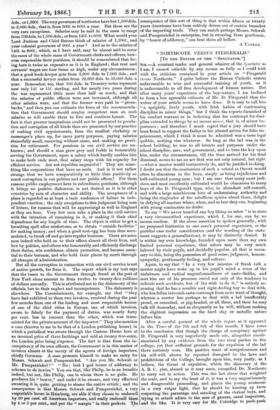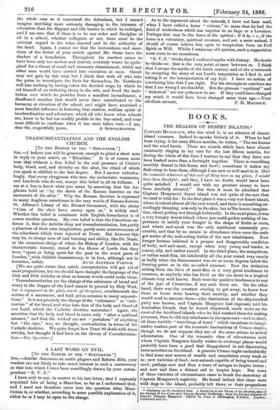"NORTHCOTE VERSUS FITZGERALD." [To THE EDITOR OF THE " SPECTATOR."]
Sirt,—A constant reader and general admirer of the Spectator as I am, I cannot coincide by any means as fully as I could wish with the criticism contained in your article on " Fitzgerald versus Northcote." I quite believe the Roman Catholic system unfavourable to wise and successful training of youth, as it is unfavourable to all free development of human nature. But after many years' experience of the boy-nature, I am inclined to form a less agreeable estimate of Mr. D. Fitzgerald than the writer of your article seems to have done. It is easy to call him "a sprightly, lively youth, with Irish habits of contemning discipline in minor things," but I think the reports furnished of his conduct warrant us in believing that his contempt for disci- pline extended to things by no means minor, that is, of minor im- portance; and therefore I much regret that a jury should have been found to support the father in his absurd action for false im- prisonment, which I think it must be admitted was a mere legal quibble, nothing else whatever. So long as the lad was in the school building; he was to all intents and purposes under the school discipline, care, and government, and to turn the key upon him, under the circumstances, till the time arrived for his final dismissal, seems to me an act that was not only natural, but right —what a master would instinctively do, and be justified in doing. I doubt not that the seminarists of such a school as Oscott would often be obnoxious to the boys, simply as being injudicious and half-cultivated young men ; but I am sure that many most judi- cious and most excellently cultivated would be obnoxious to many boys of the D. Fitzgerald type, who, in abundant sell-conceit, and with a large mischievous love of undermining authority and being the ringleader of the rebellious spirits about them, delight in defying all masters where, when, and as best they can, beginning with young seminarists no doubt.
To say " We never heard of any boy liking an usher " is to state a very circumscribed experience, which I, for one, can by no means confirm. If the above assertion be spoken generally, with no purposed limitation to one man's personal experience, or the peculiar case under consideration (and the wording of the state- ment suggests a generalization), it may be distinctly denied. It is within my own knowledge, founded upon more than my own limited personal experience, that ushers may be very much beloved by their pupils, and decidedly popular, all that is neces- sary to this, being the possession of good sense, judgment, honour, sympathy, gentlemanly feeling, and culture.
Again, to say that " In a very few minutes of frank talk a master might have woke up in his pupil's mind a sense of the unfairness and radical ungentlemanliness of caste-dislike, and sent him out of his presence cured not only of the tendency to ridicule such accidents, but of the wish to do it," is entirely as- suming that he has a sensible and right-feeling boy to deal with, who has fallen into such caste-contempt from mere want of thought, whereas a master has perhaps to deal with a lad insufferably proud, or conceited, or pig-headed, or all three, and then he may talk till doomsday, and as eloquently as he will, without making the slightest impression on the hard clay or metallic nature before him.
After a careful perusal of the whole report as it appeared in the Times of the 7th and 8th of this month, I have come to the conclusion that though the charge of conspiracy against D. Fitzgerald is very imperfectly made out, altogether unsub- stantiated by any evidence from the two rival parties in the college, yet that sufficient grounds for the expulsion of the lad there certainly were. His positive want of scrupulousness and his self-will, shown by repeated disregard to the laws and prohibitions of the College, brought upon him, very justly, as I believe, the threat of expulsion, which the discovery of the A. B. C. plot, absurd as it may seem, compelled Dr. Northcote to carry out in action. This was the last straw that weighted the scale, and to say the least of it, it was a very ungentlemanly and disagreeable proceeding, and places the young aristocrat in a very vulgar light, that he should be hunting up facts respecting the parentage and standing of the clerical boys, and
inspectors, and to attach odium to the sons of grocers, canal nspectors, and the like. It is very easy for Mr. Coleridge to pooh-pooh
the whole case as it concerned the defendant, but I cannot imagine anything more seriously damaging to the interests of education than the flippant and idle banter in which he indulged, and I am sure that if there is to be any order and discipline at all in a school, whether collegiate or not, there must be the strictest regard to the rules enacted and to the authority of the head. Again, I cannot see that the insinuations and asser- tions of the writer of your article against Mr. Stone have the shadow of a foundation. Throughout his conduct seems to have been only to modest and lenient, certainly where he apolo- gized for a threat of small and summary chastisement, which any other man would have carried into execution at once. Oscott may not gain by this trial, but I think that with all who take the pains to investigate the facts for themselves, Dr. Northcote will lose nothing by having taken the decided steps by which he rid himself of an irritating thorn in the side, and freed the insti- tution over which he presides from a manifest incumbrance, a disaffected member that would never have contributed to the harmony or elevation of the school, awl might have exercised a most baneful influence in fostering that restless, reckless spirit of insubordination and adventure, which all who know what schools are, know to be but too readily prolific in the boy-mind, and ever most difficult to eradicate when it has once taken root.—I am,































 Previous page
Previous page